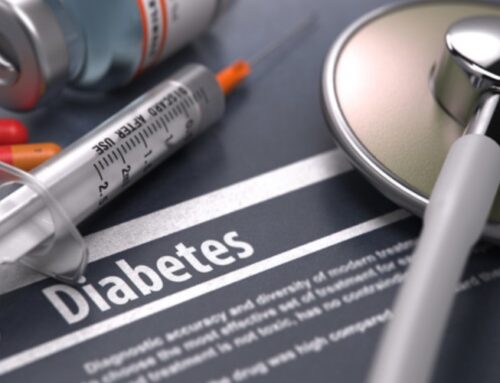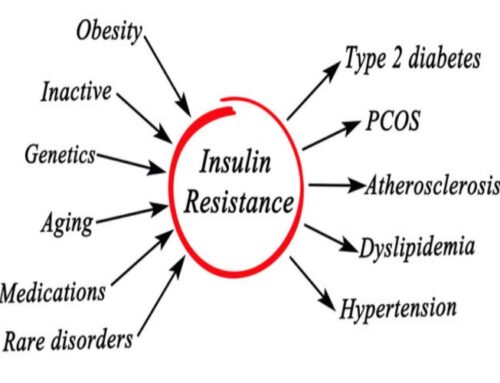Insulin is an anabolic hormone known as the Master hormone and is released from the pancreas primarily in response to rising levels of blood sugar. Blood sugar most often rises due to the consumption of carbohydrates. The more carbohydrates we consume, the more often blood sugar rises and then corresponding amounts of insulin are released from the pancreas. Insulin is necessary for stabilizing blood sugars and for enabling sugar and some nutrients to enter the cells. It is not a “bad” hormone but when blood levels of insulin become too high for too long due to insulin resistance, it can cause a lot of damage and leads to a number of chronic and debilitating health conditions including but not limited to weight gain, obesity, hypertension, diabetes, anxiety, depression, PCOS, hormonal imbalances, and digestive distress.
It is vital to health, weight loss, and weight maintenance that we have appropriate levels of insulin circulating and have cellular sensitivity to insulin. One key to optimal physical and emotional health and sustained weight loss is low levels of insulin. Please see my blog post titled “Are You Insulin Resistant” to learn more about insulin and to determine if you may be insulin resistant. Here I discuss insulin triggers, long and short-term effects of high insulin levels on the body, functions of insulin, and lastly how we can lower insulin levels.
The bodily functions of insulin include: Lowers blood sugar, absorbs glucose and feeds the cell, stores glucose into glycogen, converts glucose (sugar) to fat, converts glucose to triglycerides, converts glucose to cholesterol, prevents the burning of fat, helps muscle synthesis, DNA replication, blocks autophagy (not a good thing), increases absorption of amino acids, retains sodium and increases the absorption of potassium and magnesium. Many people who are insulin resistant are also deficient in magnesium and potassium for this reason, not only can insulin no longer effectively deliver sugar to the cells, it is unable to deliver essential nutrients such as potassium and magnesium.
The following are insulin triggers meaning they will most likely trigger the release of insulin from the pancreas leading to higher blood levels of insulin: Sugars, refined grains, frequent eating, low fat protein, excessive protein, inflammatory oils (see my blog post on good oils, bad oils), processed and refined carbohydrates, ultra-processed foods (especially those with a high ratio of carbohydrates to protein or fat – think 15+ g carbs to 2-3 g of protein, artificial sweeteners, vitamin D deficiency, potassium deficiency, trans fats, cortisol, diuretics (Thiazide), statins, beta blockers, and excess weight around the abdomen.
The possible short-term effects of high insulin levels on the body are high blood pressure, sodium retention, high cholesterol, high triglycerides (fat in the blood), muscle weakness, brain fog, PCOS, decreased concentration, vision loss or blurry vision, increased inflammation, anxiety, depression, increases stiffness, fluid retention, and ow testosterone. Further, the effects of high insulin on the muscles include cardiac arrhythmias (abnormal heart rhythms), cramping, palpitations, wasting of muscle (atrophy), inflammation, and fatty muscles.
The possible long-term effects of high insulin levels on the body are atherosclerosis (hardening and narrowing of the arteries, heart attack, thickened arteries, heart disease, high blood pressure, blood clots, stroke, cancer (13 cancers are associated with obesity and insulin resistance), calcified arteries, Alzheimer’s/Dementia (now being called Type 3 Diabetes) and early risk of death and loss of high quality of life.
Now that we have a good idea of what insulin does, how it is triggered and what effects it has on the body and muscle, let’s talk about how we can lower our insulin levels to achieve optimal health and wellness and prevent a cascade of negative health outcomes from insulin levels that are too high. The most effective ways to lower insulin and obtain insulin sensitivity is to adopt a low carbohydrate way of eating and avoid too much consumption of processed and refined carbohydrates (think chips, cookies, bread, pasta, cereal, sodas, fruit juice, candy), giving your body rest from digestion and intermittent fasting (see my blog posts titled fasting 101 and fasting 201 for more information on fasting and time restricted feeding), consume foods high in potassium, magnesium, chromium, zinc, and Vitamin D, get 20 minutes of natural sunlight daily, consider taking a quality potassium, magnesium, chromium, zinc, and/or Vitamin D3/K2 supplement (talk with your healthcare provider first), consuming a healthy amount of omega-3 fats (e.g., olive oil, salmon, tuna, other fatty fish, nuts, seeds, avocado and avocado oil), and get at least 30 minutes of daily exercise or physical activity.
If any of this resonates, I would love to work with you! I specialize in diabetes, blood sugar control and weight loss and would love the opportunity to help you meet your health goals, balance blood sugar and insulin, and truly live your best life.






